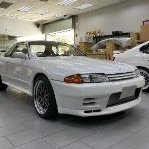Backfiring on gear change ?
Announcements
-
Similar Content
-
Latest Posts
-
I think you're really missing the point. The spec is just the minimum spec that the fuel has to meet. The additive packages can, and do, go above that minimum if the fuel brand feels they need/want to. And so you get BP Ultimate or Shell Ultra (or whatever they call it) making promises to clean your engine better than the standard stuff....simply because they do actually put better additive packages in there. They do not waste special sauce on the plebian fuel if they can avoid it. I didn't say "energy density". I just said "density". That's right, the specific gravity (if you want to use a really shit old imperial description for mass per unit volume). The density being higher indicates a number of things, from reduces oxygen content, to increased numbers of double bonds or cyclic components. That then just happens to flow on to the calorific value on a volume basis being correspondingly higher. The calorific value on a mass basis barely changes, because almost all hydrocarbon materials have a very similar CV per kg. But whatever - the end result is that you do get a bit more energy per litre, which helps to offset some of the sting of the massive price bump over 91. I can go you one better than "I used to work at a fuel station". I had uni lecturers who worked at the Pt Stanvac refinery (at the time they were lecturing, as industry specialist lecturers) who were quite candid about the business. And granted, that was 30+ years ago, and you might note that I have stated above that I think the industry has since collected together near the bottom (quite like ISPs, when you think about it). Oh, did I mention that I am quite literally a combustion engineer? I'm designing (well, actually, trying to avoid designing and trying to make the junior engineer do it) a heavy fuel oil firing system for a cement plant in fricking Iraq, this week. Last week it was natural gas fired this-that. The week before it was LPG fired anode furnaces for a copper smelter (well, the burners for them, not the actual furnaces, which are just big dumb steel). I'm kinda all over fuels.
-
Well my freshly rebuilt RB25DET Neo went bang 1000kms in, completely fried big end bearing in cylinder 1 so bad my engine seized. No knocking or oil pressure issue prior to this happening, all happened within less than a second. Had Nitto oil pump, 8L baffled sump, head drain, oil restrictors, the lot put in to prevent me spinning a bearing like i did to need the rebuild. Mechanic that looked after the works has no idea what caused it. Reckoned it may have been bearing clearance wrong in cylinder 1 we have no idea. Machinist who did the work reckoned it was something on the mechanic. Anyway thats between them, i had no part in it, just paid the money Curiosity question, does the oil system on RB’s go sump > oil pump > filter > around engine? If so, if you had a leak on an oil filter relocation plate, say sump > oil pump > filter > LEAK > around engine would this cause a low oil pressure reading if the sensors was before the filter? TIA
-
But I think you missed mine.. there is also nothing about the 98 spec that supports your claim.. according to the fuel standards, it can be identical to 95, just very slightly higher octane number. But the ulp vs pulp fuel regulations go show 95 (or 98), is not just 91 with some additives. any claim of ‘refined by the better refineries’ or ‘higher quality fuel’ is just hearsay. I have never seen anything to back up such claims other than ‘my mate used to work for a fuel station’, or ‘drove a fuel delivery truck’, or ‘my mechanic says’.. the actual energy densities do slightly vary between the 3 grades of fuel, but the difference is very minor. That said, I am very happy to be proven wrong if anyone has some hard evidence..
-
You're making my point for me. 95 is not "premium". It is a "slightly higher octane" version of the basic 91 product. The premium product that they want people to buy (for all the venal corporate reasons of making more profit, and all the possibly specious reasons of it being a "better" fuel with nicer additive packages) is the 98 octane stuff. 95 is the classic middle child. No-one wants it. No-one cares about it. It is just there, occupying a space in the product hierarchy.
-
98 and 95 have to meet the same national fuel standards beside the actual RON. 91 has lower standards (which are quite poor really), so 95 is certainly not 91 with some octane booster. It would be an easier argument to claim 98 is just 95 with some octane boosters. Also RON doesn't specify 'quality' in any sense, only the octane number. Anything different retailers decide or not decide to add to their 95 or 98 is arbitrary and not defined by the RON figure.
-


Recommended Posts
Create an account or sign in to comment
You need to be a member in order to leave a comment
Create an account
Sign up for a new account in our community. It's easy!
Register a new accountSign in
Already have an account? Sign in here.
Sign In Now